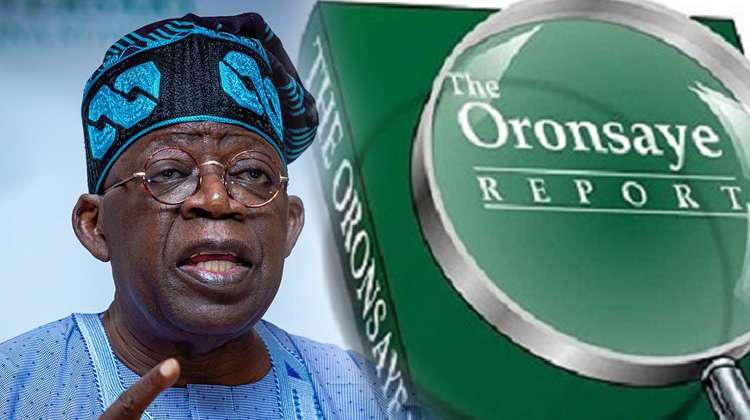President Bola Tinubu has ordered the full implementation of the Oronsaye report.
As a result, the government announced the merging, subsuming, scrapping, and relocation of several agencies.
In 2011, President Goodluck Jonathan established the Presidential Committee on Restructuring and Rationalisation of Federal Government Parastatals, Commissions, and Agencies, with Mr. Steve Oronsaye as the Chairman.
Coming from a private sector background, Oronsaye transitioned into the civil service at a senior level and ascended to the position of Head of the Civil Service of the Federation.
Submitted in 2012, the Oronsaye report highlighted the existence of 541 Federal Government parastatals, commissions, and agencies, both statutory and non-statutory.
The 800-page report recommended the reduction of statutory agencies from 263 to 161, scrapping 38 agencies, merging 52, and reverting 14 to departments in different ministries.
A previous investigation by The PUNCH found that the Nigerian government has the potential to save more than N241bn if the recommendations are put into action.
READ ALSO: 20 Insights Into Oronsaye Report As EFCC, FRSC, Others Set For Merger
Below is a list of some of the agencies that may be scrapped if the Oronsaye report is fully implemented as ordered by President Tinubu:
One of the key suggestions in the report is the consolidation of the Code of Conduct Bureau, Economic and Financial Crimes Commission, and Independent Corrupt Practices and other Related Offences Commission into a single agency.
Additionally, the report recommended the elimination of the Fiscal Responsibility Commission and the National Salaries, Income and Wages Commission, with their responsibilities being incorporated into the Revenue Mobilisation, Allocation and Fiscal Commission.
The Salaries and Wages Income Commission is likely to face a similar fate..
38 Federal Agencies were recommended for abolition, including the Public Complaints Commission, National Poverty Eradication Programme, Utilities Charges Commission, National Agency for the Control of HIV/AIDS, National Intelligence Committee, and more.
National Agency for the Control of HIV/AIDS be merged as a Department under the Centre for Disease Control in the Federal Ministry of Health.
The merger of National Emergency Management and the National Commission for Refugees, Migrants, and Internally Displaced Persons.
READ ALSO: JUST IN: Tinubu Orders Full Implementation Of Oronsanye Report
The Directorate of Technical Cooperation in Africa be abolished and its functions, along with those of the Technical Aids Corps, transferred to an appropriate Department in the Ministry of Foreign Affairs.
Infrastructure Concessionary and Regulatory Commission be subsumed in the Bureau of Public Enterprises for greater synergy and their enabling laws amended accordingly.
It was suggested that the Nigerian Airspace Management Agency, Nigerian Civil Aviation Authority, and the Nigerian Metrological Agency should be combined into a new entity called the Federal Civil Aviation Authority, with their laws adjusted to accommodate the merger.
The committee suggested merging the Nigerian Investment Promotion Council with the Nigerian Export Promotion Council to enhance resource management and utilisation.
The committee suggested repealing the enabling law of the National Commission for Nomadic Education and transferring the Commission’s activities to the Universal Basic Education Commission.
The National Council of Arts and Culture will combine with the National Theatre and the National Troupe to form a single organisation.
READ ALSO: Peter Obi Knocks Tinubu Over Arrest Of BDC Operators
The National Agency for Science and Engineering Infrastructure be merged with National Centre for Agricultural Mechanization and Project Development Institute
The committee suggested that the National Hajj Commission of Nigeria and the Nigerian Christian Pilgrims Commission be abolished, with the government focusing solely on offering consular services and vaccinations to prospective pilgrims.
The Nigerian Communications Commission, the Nigerian Broadcasting Commission and the regulatory functions of the Nigerian Postal Services were recommended by the committee to be merged.
The National Information Technology Development Agency to be fused into the Ministry of Communication Technology
Nigerian Television Authority, Federal Radio Corporation of Nigeria & Voice of Nigeria into the Federal Broadcasting Corporation of Nigeria.
The Nigerian Army University to be merged with the Nigerian Defence Academy; to function as a faculty with the the Nigerian Defence Academy.
Air Force institute of Technology also to function as faculty within Nigerian Defence Academy.
Debt Management Office to become an extra-ministerial department in the Federal Ministry of Finance Public Health Department to return to the Federal Ministry of Health
The Nigerian Investment Promotion Council was recommended to merge with the Nigerian Export Promotion Council to enhance resource management and utilisation.
One important recommendation from the committee was to stop providing government funding to professional bodies and councils. Therefore, it is necessary to revise the Professional Bodies (Special Provisions) Act of 1972, which requires the government to offer financial assistance to these organisations.
The list comprises various professional councils and boards in Nigeria, such as the Teachers Registration Council of Nigeria, Computer Professionals Council of Nigeria, Advertising Practitioners Council of Nigeria, Nigeria Press Council, Architects Registration Council, Council for Registered Engineers of Nigeria, Estate Surveyors’ Registration Board, Town Planners Council, Nigerian Builders Council, Quantity Surveyors’ Registration Board of Nigeria, and Council of Nigerian Mining Engineers and Geoscientists.
